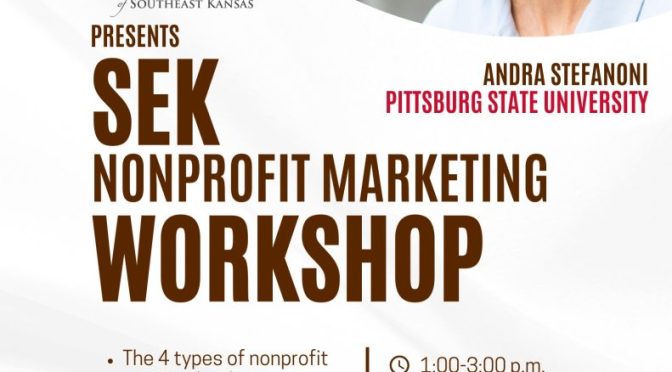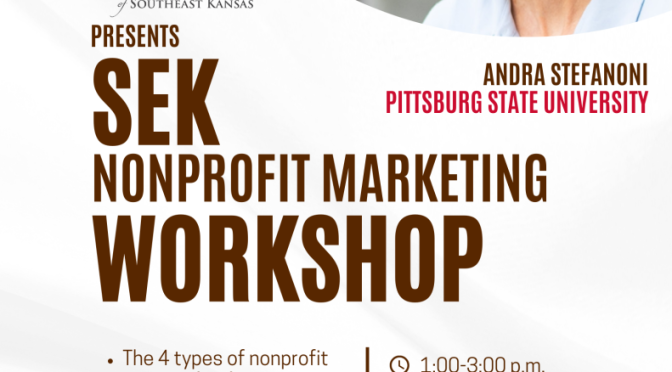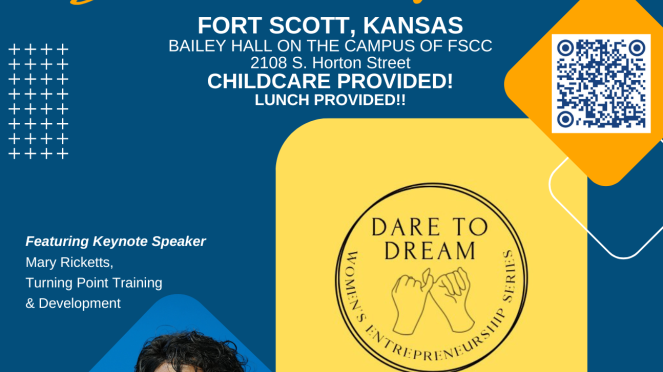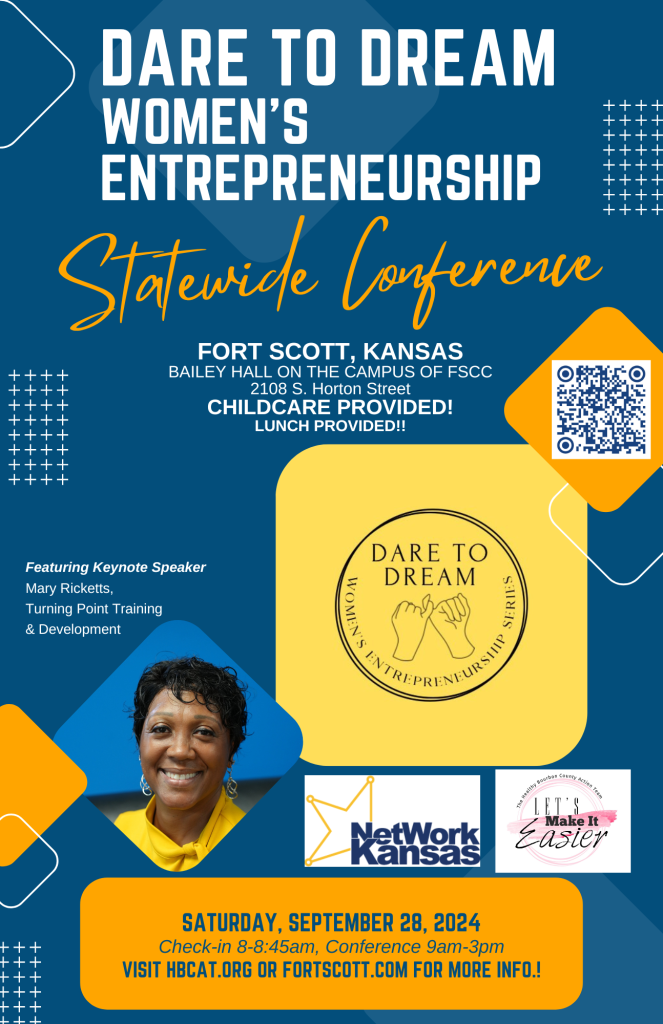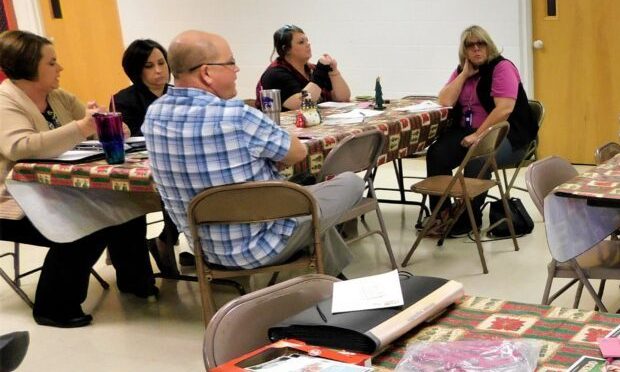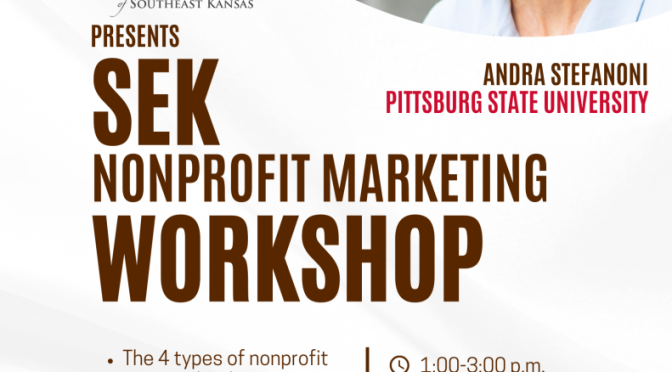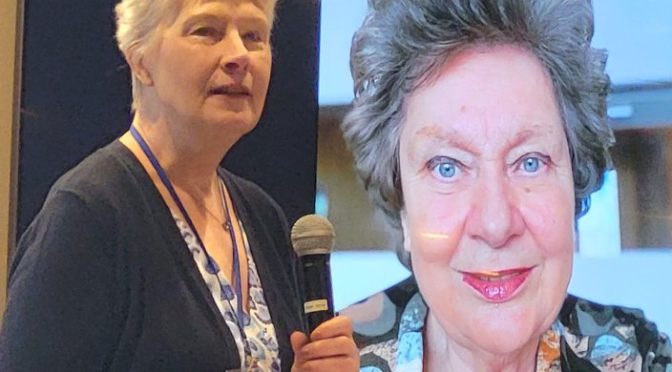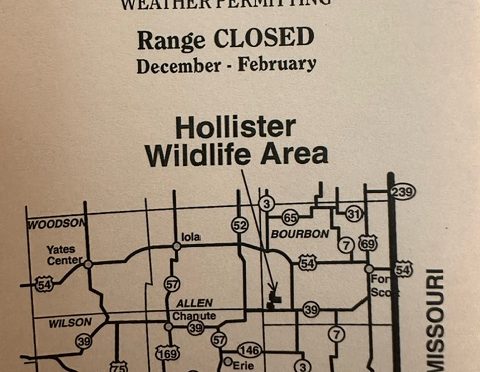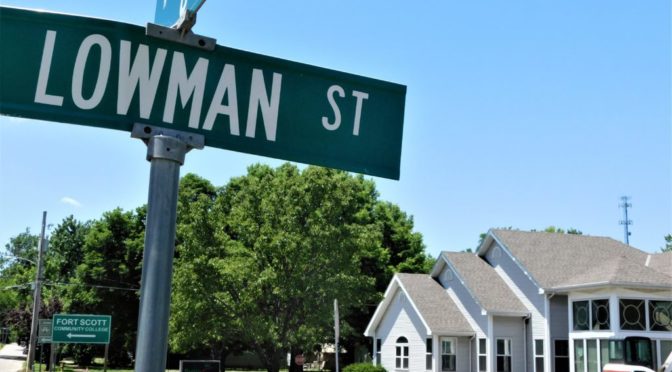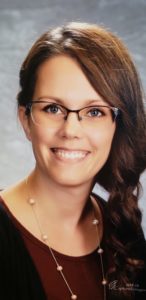Category Archives: Area News
Women’s Health Fund Grant Applications Are Open Until September 30
|
|
|
 |
|
|
|
Non Profit Marketing Workshop on September 19
Dare To Dream Women’s Entrepreneurship Statewide Conference Sept. 28
Rita J. Bicknell Women’s Health Fund 2024 Grant Application Now Open
The Community Foundation of Southeast Kansas (CFSEK) is pleased to announce that the Rita J. Bicknell Women’s Health Fund 2024 grant applications are now open.
In 2007, the establishment of the Rita J. Bicknell Women’s Health Fund at CFSEK was a philanthropic beginning for women helping women in our area. Today, the Fund is made up of the Women’s Giving Circle, the Circle of Friends, and the Nightingale Endowment.
Annual memberships in these giving circles support the awarding of grants to carry on the group’s mission, “To improve the health and wellbeing of women by supporting education, increasing awareness, and sharing quality of life opportunities to benefit all women.”
Since its inception, the Women’s Health Fund has granted over $400,000 to improve women’s health throughout Southeast Kansas, including $52,511 in grants last year. The annual support provided by these memberships not only help provide immediate grants, but they also build the endowment so that more grant dollars are available every year.
“The Rita J. Bicknell Women’s Health Fund is an inspiring example of what can be achieved by a dedicated group combining their resources to improve their community,” said Devin Gorman, CFSEK Executive Director. “We are blessed with so many compassionate and caring women in our area who are committed to the improvement women’s healthcare in our region.”
Applications are available at SoutheastKansas.org/Grant-App. Applications close on September 30th.
The Community Foundation of Southeast Kansas is pleased to be the host agency for the Rita J. Bicknell Women’s Health Fund. CFSEK serves the region by helping donors fulfill their charitable giving goals in ways that benefit the common good and improve the quality of life. If you would like to learn more about the CFSEK or the RJB Women’s Giving Circles, please visit SoutheastKansas.org/WHF or call 620-231-8897.
Bourbon County Coalition Meets Sept. 4
Bourbon County Inter-Agency Coalition
General Membership Meeting Agenda
We will be meeting at the Keyhole this week for our September 4 General Meeting. The Keyhole is located at the corner of 10th. and Main Street across from the south end of the Fort Scott High School. See you Wednesday at 1:00 p.m. at The Keyhole
- Welcome:
- Member Introductions and Announcements:
- Program: Judy Hood will give us an update on The Keyhole.
October program will be by Dustin Emmett, Retain Outreach Coordinator for SEKANSASWORKS.
- Open Forum:
- Adjournment: The next General Membership meeting will be October 2, 2024.
CFSEK Presents a Free Nonprofit Marketing Workshop
The Community Foundation of Southeast Kansas (CFSEK) is hosting a free Nonprofit Marketing Workshop on Thursday, September 19th from 1:00-3:00 p.m. With presentations from Andra Stefanoni, Director of Media Relations at Pittsburg State University, CFSEK is offering this free workshop for nonprofit staff and volunteers to help increase their marketing capacity and skills.
“We are so excited to offer this for our nonprofit partners around the region,” said CFSEK Marketing and Communications Coordinator, Matthew Buck. “Andra Stefanoni has so much experience and insight, and I think it will be really valuable to everyone who attends!”
Some of the topics being discussed are:
- The four kinds of nonprofit communication and best practices for each
- How to write a press release that will get noticed by media
- Storytelling on your own channels and how it can help you advance your organization
- Communication and promotional tools for your tool kit
The free Workshop will take place via Zoom on Thursday, September 19th, from 1:00-3:00 p.m. Registration is available online at SoutheastKansas.org/npm24.
For questions or more information, contact Matt at (620) 231-8897 or at SoutheastKansas.org/Contact/Matthew.
Interested in a Good Read?
|
The SEKnFind Newsletter
August 2024
|
||||||||||||||||||||||||||||||||||||||||||||||||||||||||||||||||||||
|
||||||||||||||||||||||||||||||||||||||||||||||||||||||||||||||||||||
Women’s Christian Temperance Union News
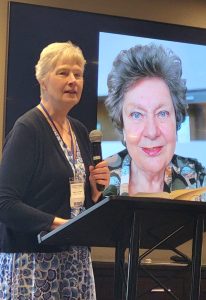
Submitted by Loreta Jent
Hosted by national officers, the National Woman’s Christian Temperance Union (WCTU) celebrated its Sesquicentennial recently, August 5-8, 2024, in the beautiful Amish country
of Berlin, Ohio.
Attendees from this community were the National Educator Director, Loreta Jent and husband, Larry, from rural Fort Scott, KS.
Convention business, reports, and awards took place followed by special celebration activities such as attending a
production of “Ruth” at the Ohio Star Theater, and discovering the Amish culture through a beautiful cyclorama at the Amish Mennonite Heritage Center in nearby Behalt, OH.
President Merry Lee Powell gave a closing banquet address entitled, “150 Years – Now What?”
Pictured is President Powell as she invited and announced that NWCTU will host the 42nd World WCTU Convention, July 21-25, 2025, in Skokie, IL.
Pictured on the screen behind President Powell is World WCTU President from Norway, Margaret Ostenstad, who plans to be present with many other WCTU women from around the world!
Hollister Wildlife Area and Shooting Range: Gun Practice Area

Bryan Buchta is the president of Old Fort Sharp Shooters Club, a gun club. That club volunteers at a local wildlife area, Hollister Wildlife Area and Shooting Range, eight miles southwest of Fort Scott.
The Hollister Wildlife Area has been a state wildlife area since 1978, when it was purchased by the Kansas Fish and Game, according to the Kansas Wildlife and Parks website. The wildlife area includes 2,432 acres of rolling range and pasture land, interspersed with native woodlands.
The shooting range, within the wildlife area, is operated solely by volunteer Range Safety Officers (RSO’s) who adhere to National Rifle Association range safety guidelines, Buchta said.
There are always two Range Safety Officers on duty during the times of the shooting range events.
Firearm safety and knowledge are the club’s main goals.
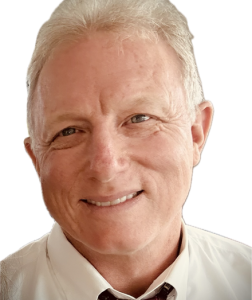
“There are about 250 memberships,” he said. “There are about 50-75 regulars. Although it’s never crowded there.”
“During hunting season, hunters come out to sight their rifles,” Bryan said. “There are also shooting competitions.”
There was a 22 caliber rife competition recently and there is an upcoming pistol competition, he said.
“Pistol competitions; “Steel Challenge” and “Action Pistol”, are held on the 2nd and 4th Sundays respectively each month at 8:00 am,” he said. ” Everyone is welcome to compete in the matches including new shooters as the RSOs and competitors are always happy to teach new shooters how the competition operate.”
The Bourbon County Sheriff’s Office and the Fort Scott Police Department also do training at Hollister Shooting Range.
The Sharp Shooters meet the first Wednesday of each month at the fire station on 54 Hwy. east of Fort Scott and the public is welcome.
Bryan Buchta can be reached at 913-368-8811.
Veteran’s Benefit: A Place to Stay in K.C. For Medical Visits
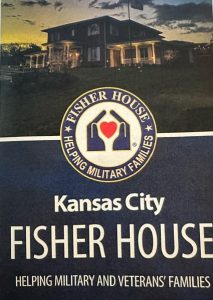
The Buchta’s also wanted veterans to know of Fisher House in Kansas City, which is accommodations provided for vets receiving medical care.
“My husband is a veteran and he’s had multiple procedures at the Kansas City Veterans’ Administration Hospital hospital and if an overnight is needed for the procedure, or if it’s early in the morning, even if it’s outpatient, you can request to stay at the Fischer house. It is a 100% free ‘hotel room’.The people in the Fort Scott and the surrounding area qualify for this benefit because we are more than 50 miles away from the hospital,” Julie said.
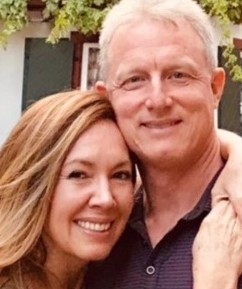
“It has a fully stocked amazing kitchen, with snacks and food options in the fridge and freezer, free of charge.… although the procedures can be at any area hospital, it does not have to be at the VA hospital,” she said.
“They are very kind and accommodating,” she said. “The Fisher House was built approximately 3 or 4 years old and is a gorgeous facility.”
The address of the Fisher House is 4801 E. Linwood Blvd.
Kansas City, MO64128, which is near the VA Hosptial.
The manager is Mike Peters who can be reached at
[email protected]
or (816) 714-8697
To learn more:
https://fisherhouse.org/about/our-history/
Viral Infections On The Rise In The Region
|
|
|||
- Practice Good Hand Hygiene: Regularly wash your hands with soap and water for at least 20 seconds. Hand hygiene is one of the most effective ways to prevent the spread of viruses.
- Wear a Mask: Masks are particularly important in crowded or enclosed spaces where social distancing may be difficult. They help reduce the transmission of respiratory droplets.
- Cover Coughs and Sneezes: Always use a tissue or your elbow to cover your mouth and nose when you cough or sneeze. This simple action helps prevent the spread of germs to others.
- Stay Home if You Are Sick: If you are experiencing symptoms of a respiratory illness, please stay home to avoid spreading the virus to others. Rest and recovery are essential for your health and the health of our community.
- Get Vaccinated: Staying up to date with your flu shot and COVID-19 vaccine (when available) is one of the most effective ways to protect yourself and others from serious illness. You may also want to consider getting the RSV vaccine if you are pregnant or are 60 years or older.
We encourage everyone to follow these guidelines and stay informed about the latest public health recommendations. Together, we can make a significant impact in reducing the spread of respiratory viruses in our community.
Thank you for your attention to this important matter. By working together, we can keep our community healthy and safe.
Sincerely,
Rebecca Johnson, BSN, RN
Administrator/SEK Local Health Officer
SEK Multi-County Health Department
|
|
|||||||||||||||
Several Bourbon County Entities Awarded CFSK Grants
CFSEK Awards $170,000 to SEK Nonprofits
The Community Foundation of Southeast Kansas (CFSEK) is excited to announce General Funds grants totaling $170,000 have been awarded to 65 nonprofit organizations across 23 counties in Southeast Kansas.
The areas of Basic Human Needs, Youth Activities, and Arts & Culture are the focus of the CFSEK General Funds competitive grant process. Proposals for projects in these focus areas were accepted during the month of June. Submissions were reviewed, and selections for funding were completed late last month.
“We are continually inspired by the commitment of our nonprofit partners in Southeast Kansas, and we take pride in supporting their impactful work,” said Devin Gorman, CFSEK Executive Director. “These organizations deliver a diverse range of programs, services, and activities that significantly enhance our community. We know these grants will truly benefit Southeast Kansas as a whole.”
Since 2004, competitive granting from funds directly managed by CFSEK have provided over $1.8 million to organizations throughout Southeast Kansas. Competitive granting differs from other granting provided by CFSEK, such as donor-advised grants, designated grants, field of interest grants, and others. Since its inception in 2001, CFSEK has provided over $22 million in total grant funding throughout Southeast Kansas.
The following organizations and projects were awarded funds from the 2024 General Funds grant process:
Arts & Culture – $5,200
- Big Brutus, Inc. – Brutus Fest 2025
- Family Resource Center, Inc. – Children’s Art Gala
- Howard City Library – Culture Experience
- Josiah Fletcher Foundation – Scholarships for Jazz Camp
- Spring River Mental Health and Wellness – Pathfinders
- USD 404 Riverton – Elementary Cafeteria
Basic Human Needs – $71,800
- Care Cupboard Hygiene Pantry – This Is How We Roll
- Catholic Charities, Inc. – Housing and Homeless Services
- Catholic Diocese of Wichita – The Lord’s Diner-Pittsburg – Weekend Nutrition Matters
- CLASS LTD – AED Access for Individuals with IDD
- Coffey Health System – Commitment to Excellence, Baby Approved
- Community Food Pantry Fund – Milk Money
- Community Health Center of Southeast Kansas – Southeast Kansas Diaper Stock
- Cornerstones of Care – Stopping the Spiral
- Crosstimbers Food Pantry Association – Feeding the Need
- DBLO Association – Beds for Children in Need
- Dream Center of the 4 States – Help and Hope
- Families and Children Together, Inc. – Starting with the Basics
- First Baptist Church Riverton – Share with Love Food Pantry
- First United Methodist Church Wesley House – Food for Families
- Fort Scott Community College – Greyhound Pantry Upgrade
- Fort Scott Compassionate Ministries – Family Empowerment and Stability
- Happy Kids Daycare & Preschool, Inc. – Safety First
- Homer Cole Community Center Inc – Ensuring Guest Safety and Keepin’ Up Appearances
- Howard City Library – Drinking Water Availability
- Safehouse Crisis Center, Inc. – Welcome Home
- Humanity House Foundation – Feeding Allen County 2024
- Integrated Behavioral Technologies, Inc. – Individual ABA Start-up Kits for Children in Autism Program
- Labette County Emergency Assistance Center – Emergency Funds for Labette County Families
- McCune Lions Club – Restroom Addition to Pavilion
- Mosaic – Ensuring Safety, Security and Well Being
- Sacred Heart Parish – Enhancing Client Access to Quality Frozen Meat
- SEK-CAP – Safe Homes
- Southeast Kansas Area Agency on Aging – TC Fund All Counties
- Southwind Extension Education Foundation Inc – Kitchen Restore
- The Beacon Inc. – Maintaining Food Assistance
- The Salvation Army – Pittsburg Home Goods Pantry and Personal Hygiene Items
Youth Activities – $93,000
- Altamont Public Library – Youth Activity Area
- Caney Valley Agape Network, Inc. – Grandfamilies and Youth Support
- Chanute Public Library – Literacy4Littles
- Cherry Street Youth Center, Inc. – Garden Improvements
- City of Galena – City Park Splashpad Shade
- City of Girard – Diving into Summer with New Diving Boards
- City of Mulberry – Mulberry Ball Park Improvements
- Columbus Area Community Foundation – Youth Activities Granting
- Columbus USD 493- Park Elementary – Sensory/Focus Room
- Crawford County Fair Association – Show Arena and Livestock Barn Paint Upgrade
- Curious Minds Discovery Zone, Inc. – Backyard Exhibit Landscaping
- Eden Early Learning Academy – Sensory Play in Safe Spaces
- Families and Children Together Inc. – Here Comes the Sun
- First United Methodist Church Wesley House – The Cozy Kids, Coats for Kids Program
- Fort Scott Area Community Foundation – Youth Activities Granting
- Fostering Connections – Sleep in Safety Program
- Friends of Crawford State Park via Kansas Wildscape Foundation – Outdoor Education at the Lake
- Girard Area Community Foundation – Youth Activities Granting
- Girard FFA Chapter – Sand Blasting
- Girl Scouts of the Missouri Heartland – Tables for Girl Scout Outdoor Activities
- Howard City Library – Reading Incentive Program
- Learning Tree Institute at Greenbush – Aligning the Stars
- Miners Hall Museum Foundation – MHM/Franklin Community Park Continued Improvements
- Our Lady of Lourdes Parish/St. Mary’s Colgan Catholic Schools – Resurfacing the Track
- Ozark Trails Council, Boy Scouts of America – Hooked On Scouting Recruitment Campaign
- Southeast Kansas Baptist Association – A Threefold Cord-Faith, Friendship and Fun
- Southeast Kansas Mental Health Center – It’s More Than A Snack
- Special Olympics Kansas – Sports Equipment
- Patrick Catholic School – Students Learning Through Technology
- TFI Family Services – Helping SE Kansas Teens in Care Become Adults
- The Foster Closet, Inc. – Family Enrichment Events
- University of Kansas Medical Center Area Health Education Center – Journeys & Destinations – Girard, KS
- Victory Life Church – Back2School Event 24
The CFSEK Board of Trustees and staff congratulate all the 2024 grant recipients!
For additional information related to CFSEK’s competitive granting opportunities, visit www.SoutheastKansas.org or call 620-231-8897.
